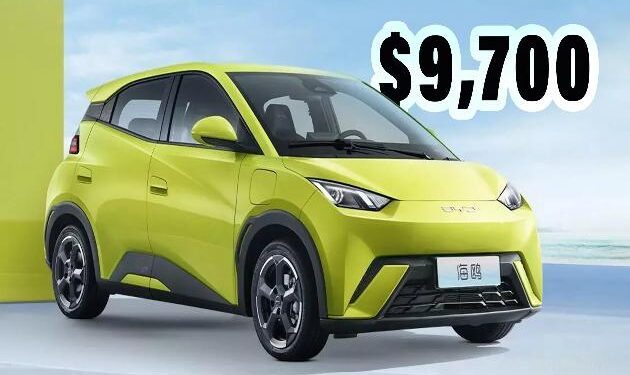WASHINGTON, D.C.: The potential influx of low-priced Chinese electric vehicles (EVs) into the U.S. market via Mexico is causing concern among American automakers.
This scenario could disrupt the domestic EV market, where homegrown EVs, averaging US$55,000, would struggle to compete against their significantly cheaper Chinese counterparts.
Chinese automakers could leverage North American trade rules to set up production in Mexico and export their EVs to the U.S. at minimal tariffs, potentially as low as 2.5 percent. This possibility has sparked fears of a repeat of the devastating impact that subsidized Chinese products had on American industries like steel and solar equipment.
“Time and again, we have seen the Chinese government dump highly subsidized goods into markets for the purpose of undermining domestic manufacturing,” Sen. Sherrod Brown, an Ohio Democrat, wrote in an April letter to President Joe Biden that called for an outright ban on Chinese electric vehicles in the U.S. “We cannot let the same occur when it comes to EVs.”
The Alliance for American Manufacturing has echoed these concerns, warning that an influx of low-priced Chinese EVs could be an “extinction-level event” for the American auto industry.
The U.S.-Mexico-Canada Agreement (USMCA), enacted in 2020, could facilitate this scenario. The agreement allows vehicles assembled in Mexico to enter the U.S. either duty-free or at a nominal tariff, provided they meet certain North American content requirements. This could enable Chinese automakers to significantly undercut U.S. prices.
The U.S. has several options to mitigate this threat. Customs officials could rule that Chinese EVs assembled in Mexico don’t qualify for USMCA benefits, or policymakers could pressure Mexico to exclude Chinese vehicles. Another approach could involve barring Chinese EVs on national security grounds, given concerns about data collection and potential remote access capabilities.
Former President Donald Trump suggested imposing a 100 percent tariff on Chinese EVs to protect the American market. However, any measures taken by the U.S. government will likely face legal challenges from companies wanting to import Chinese EVs.
The threat from Chinese EVs comes when U.S. automakers are already facing challenges in the EV market, including slowing sales and high production costs. Despite federal tax incentives, high prices and a scarcity of charging stations have hindered EV adoption in the U.S.
Some experts argue that allowing low-priced Chinese EVs into the U.S. could accelerate EV adoption and drive down prices. Christine McDaniel, a senior research fellow at George Mason University’s Mercatus Center, suggested that market competition could benefit consumers, even if it disrupts the industry. “It would be cheaper just to let the Chinese cars come in, forget all the tariffs and subsidies, let the market figure it out,”
China currently leads the global EV market, producing nearly 62 percent of the world’s battery-powered EVs last year. In contrast, the U.S. produced less than 10 percent, according to GlobalData. Chinese automakers like BYD have achieved significant cost efficiencies through government subsidies, enabling them to offer models like the Seagull for as low as $12,000 in China.
The Biden administration has already increased tariffs on Chinese EVs to 102.5 percent, aiming to price them out of the U.S. market. The European Union has also announced plans to impose tariffs on Chinese EVs.
Despite these efforts, the USMCA could still allow Chinese EVs assembled in Mexico to enter the U.S. at a much lower tariff. Vehicles must have 75 percent of their content sourced from North America and meet specific labor conditions to qualify for duty-free treatment under the USMCA, which could be challenging for Chinese automakers.
U.S. officials could reject the notion that a substantial transformation occurred during the assembly process. But the U.S. would struggle to prevail if that decision were challenged in the U.S. Court of International Trade, “given the substantial changes that typically take place in automotive assembly factories,” David Gantz, a trade lawyer and a fellow at Rice University’s Baker Institute for Public Policy, has written.
Still, Gantz said by email: “My takeaway is that using one or more of the available trade and national security mechanisms available to the U.S. government, the U.S. will be successful in excluding Mexican/Chinese EVs.”
The Biden administration has ordered an investigation into Chinese “smart cars” technology as a potential precursor to such a ban.
Ultimately, the U.S. may leverage its significant influence over Mexico, its primary export market, to prevent Chinese EVs from entering the North American market.
As McDaniel pointed out, the U.S. has substantial leeway to protect its interests, particularly given the current geopolitical climate and the weakened state of global trade enforcement mechanisms like the World Trade Organization.
The WTO’s Appellate Body, which acts as its supreme court, ceased functioning effectively in December 2019 after the U.S. blocked the appointment of new judges. As a result, trade disputes now remain unresolved indefinitely.
“We are no longer operating in a WTO-regulated environment,” McDaniel stated. “We are in a world where power dictates outcomes – that’s the reality now.”






